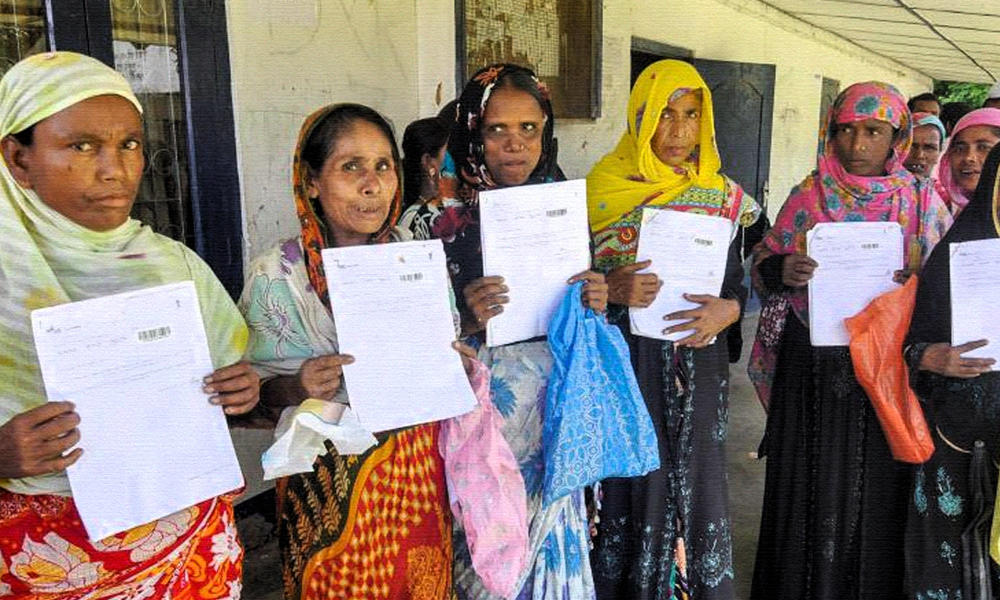
Image Credits: The New Indian Express
Six New Questions In NPR Form Creating 'Fear' In the Minds of Minorities?
India, 6 March 2020 1:06 PM GMT
Editor : Prateek Gautam
A free soul who believes that journalism, apart from politics, should stand for social cause and the environment.
The questions added include details of parents’ birth, Aadhar number, passport number, mobile phone number, voter ID number and mother tongue.
Amidst the anger and confusion over the Citizenship Amendment Act (CAA), National Register of Citizens (NRC) and National Population Register (NPR), the government has put out the new NPR form where six additional questions have been introduced.
The questions added include details of parents' birth, Aadhar number, passport number, mobile phone number, voter ID number and mother tongue.
National Population Register (NPR) is a register of "usual residents" of the country.
The register is prepared at several levels including local (village/sub-town), subdistrict, district, state and national. It comes under provisions of the Citizenship Act, 1955, and the Citizenship (Registration of Citizens and Issue of National Identity Cards) Rules, 2003.
A usual resident in this context is defined as a person who has resided in a local area for the past six months or more or a person who intends to reside in that area for the next six months.
The NPR exercise which is to be carried out every 10 years, is scheduled to be conducted between April and September 2020 in all states and Union Territories (UTs) except for Assam.
NPR: State Governments Vs Union Government
Amidst speculations that NPR is the first step in creating an all-India NRC that would identify undocumented migrants residing in India, the states not ruled by the National Democratic Alliance (NDA) have strongly objected to the questions in the form, citing reasons of fear and insecurity amongst the minorities.
Bihar
Bihar Chief Minister Nitish Kumar asserted that NPR will be "carried out the way it was done in the year 2010," while addressing a crowd at the Maulana Azad National Urdu University in Darbhanga district, reported The Scroll.
Earlier, Kumar was also seen urging the Union Government to use the 2011 NPR form for the exercise instead of a new one.
"The new NPR form is creating more apprehensions and fear," Kumar told media in January.
"There are many columns, like place and date of birth of parents, which are unnecessary," he added.
Bihar Chief Minister Nitish Kumar in Patna: As far as NPR (National Population Register) is concerned, it will be on the basis of 2010 format & we've also passed the resolution in the State Legislative Assembly. https://t.co/NiBKDvW3oe
— ANI (@ANI) March 1, 2020
Andhra Pradesh
Andhra Pradesh Chief Minister, YS Jagan Mohan Reddy, took to social media, on Tuesday, March 3, stating that his government will pass a resolution in the ongoing Budget session of the state assembly, requesting the Centre to maintain the NPR as it existed in the year 2010.
"Some of the questions proposed in the NPR are causing insecurities in the minds of minorities of my state. After elaborate consultations within our party, we have decided to request the Central Government to revert the conditions to those prevailing in 2010," said the tweet.
"To this effect, we will also introduce a resolution in the upcoming Assembly session," the Chief Minister added.
Some of the questions proposed in the NPR are causing insecurities in the minds of minorities of my state. After elaborate consultations within our party, we have decided to request the Central Government to revert the conditions to those prevailing in 2010. (1/2)
— YS Jagan Mohan Reddy (@ysjagan) March 3, 2020
To this effect, we will also introduce a resolution in the upcoming assembly session. (2/2)
— YS Jagan Mohan Reddy (@ysjagan) March 3, 2020
Tamil Nadu
Tamil Nadu Chief Minister, Edappadi K Palaniswami, said that people can choose to omit the three new questions in the NPR form.
Speaking to reporters at Madurai airport, on Sunday, March 1, he said that NPR will be carried out during the Census in Tamil Nadu and that people can choose to not answer the newly-added questions.
He said residents were free to omit the three newly added questions in the NPR form, which were language, place of birth of mother and father and number of Aadhaar and ration cards.
 All section
All section













